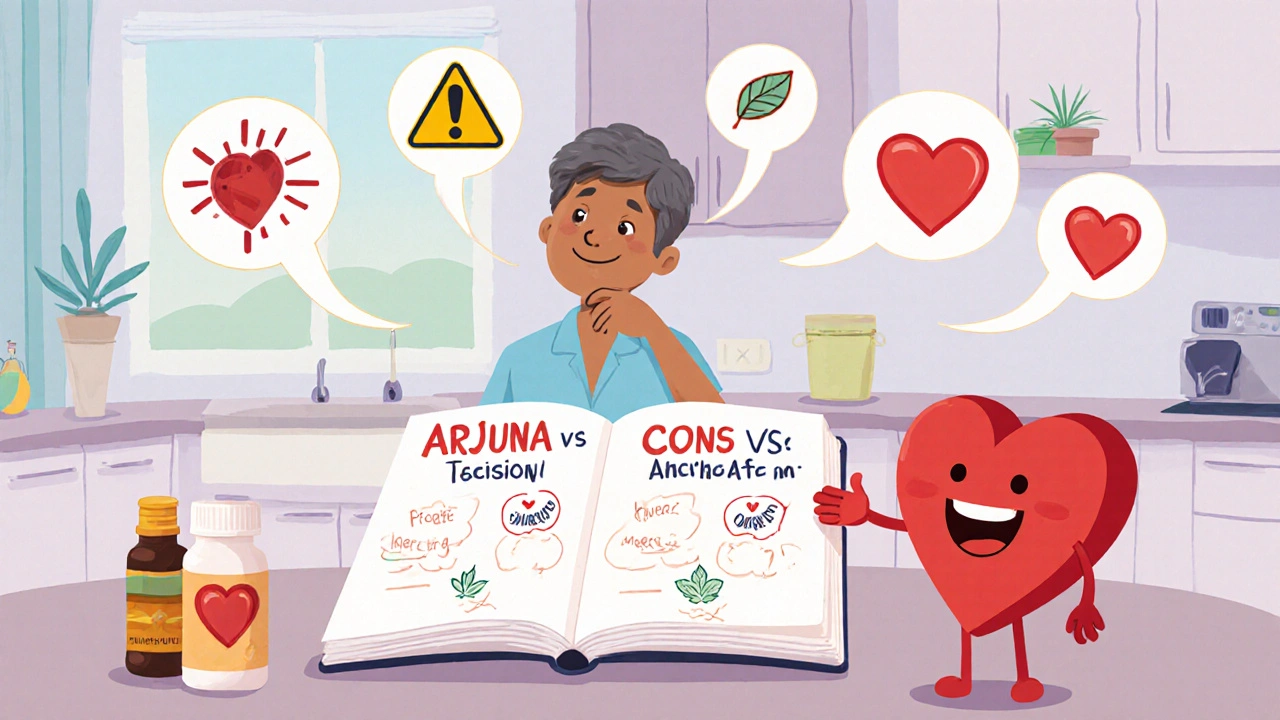Heart Supplement Selector
Find Your Ideal Heart Supplement
Select your primary health goal to discover which natural heart supplement might be best for you.
Your Recommendation
Best For:
Key Benefits:
When looking at herbal heart health, Arjuna bark extract is a traditional Indian supplement derived from the bark of the Terminalia arjuna tree, known for its cardioprotective properties. It’s become a go‑to option for people who want a plant‑based way to support blood pressure, cholesterol, and overall circulation. But it’s not the only game‑changer on the shelf. Below we break down how Arjuna stacks up against other popular natural heart aids so you can pick the one that fits your goals and lifestyle.
What is Arjuna bark extract?
The bark of Terminalia arjuna is a fast‑growing tree native to the Indian subcontinent. Its pharmacologically active compounds include flavonoids, tannins, and a group of triterpenoid saponins called arjunic acids. Traditional Ayurvedic texts claim it strengthens the heart muscle, improves myocardial contractility, and reduces oxidative stress.
How does Arjuna support cardiovascular health?
Modern research points to three main mechanisms:
- Antioxidant action: The flavonoids scavenge free radicals that would otherwise damage blood vessels.
- Vasodilation: Arjunic acids help the endothelium release nitric oxide, widening arteries and lowering blood pressure.
- Lipid regulation: Animal studies suggest a modest drop in LDL‑cholesterol and triglycerides after 8‑12 weeks of supplementation.
Clinical trials in humans are still limited, but a 2022 meta‑analysis of six randomized controlled studies reported an average systolic blood pressure reduction of 6 mm Hg versus placebo.
Common alternatives on the market
Here are the most frequently compared herbal or nutraceutical heart boosters:
- Hawthorn (Crataegus monogyna) is a small shrub whose berries and flowers contain oligomeric proanthocyanidins that improve coronary blood flow.
- Garlic extract (Allium sativum) delivers allicin, a sulfur compound that lowers blood pressure and modestly reduces LDL‑cholesterol.
- Coenzyme Q10 (CoQ10) is a mitochondrial co‑factor that supports energy production in heart cells and acts as a powerful antioxidant.
- Guggul (Commiphora wightii) resin contains guggulsterones, which have been shown to influence cholesterol metabolism.
- Turmeric (Curcuma longa) provides curcumin, a polyphenol with anti‑inflammatory and antiplatelet effects.
- Vitamin D is a fat‑soluble vitamin that, when deficient, correlates with higher risk of hypertension and heart disease.

Side‑by‑side comparison table
| Supplement | Primary Active Compounds | Typical Daily Dose | Evidence Strength | Average Price (AU$) |
|---|---|---|---|---|
| Arjuna bark extract | Flavonoids, arjunic acids, tannins | 300‑500 mg of standardized extract | Moderate (meta‑analysis of RCTs) | 30‑45 |
| Hawthorn | d>Proanthocyanidins, flavonoids | 250‑500 mg | Moderate (several double‑blind trials) | 25‑40 |
| Garlic extract | Allicin | 600‑1200 mg (standardized) | Strong (large meta‑analyses on BP) | 20‑35 |
| CoQ10 | Ubiquinol/Ubiquinone | 100‑200 mg | Strong (heart failure and statin‑induced myopathy) | 40‑70 |
| Guggul | Guggulsterones | 250‑500 mg | Weak (mixed results on cholesterol) | 25‑45 |
| Turmeric (curcumin) | Curcumin | 500‑1000 mg (with piperine) | Moderate (anti‑inflammatory, limited CV data) | 30‑55 |
| Vitamin D | 1,25‑dihydroxyvitamin D3 | 1000‑2000 IU | Strong (deficiency linked to hypertension) | 15‑25 |
Pros and cons of each option
Arjuna bark extract offers a balanced mix of antioxidant and vasodilatory effects, making it a solid all‑rounder for mild hypertension and cholesterol support. However, high‑quality, standardized products can be pricier than generic garlic pills.
- Hawthorn: Excellent for coronary blood flow and mild heart failure; taste can be bitter and some extracts lack standardization.
- Garlic extract: Best‑studied for blood pressure; may cause strong breath odor and gastrointestinal upset.
- CoQ10: Great for energy‑driven heart cells and statin side‑effects; needs fat‑rich meal for absorption.
- Guggul: Potential cholesterol reducer; risk of liver enzyme elevation in rare cases.
- Turmeric: Powerful anti‑inflammatory; bioavailability is low without piperine.
- Vitamin D: Essential for overall cardiovascular risk; toxicity only at very high doses.
How to choose the right supplement for you
- Identify your primary goal. If high blood pressure is the main concern, garlic or Hawthorn may edge out Arjuna. For a blend of antioxidant and mild vasodilation, Arjuna shines.
- Check for existing conditions. People on blood thinners should avoid high‑dose Hawthorn and Turmeric without medical guidance.
- Look for standardization. A label that states “standardized to 30% flavonoids” (for Arjuna) or “allicin 5 mg” (for garlic) ensures potency.
- Consider cost and dosing frequency. Daily pills that fit your routine are more likely to be taken consistently.
- Consult a healthcare professional. Especially if you’re on prescription meds like beta‑blockers or statins.

Safety, interactions, and side effects
Arjuna is generally well‑tolerated, but occasional mild GI upset or headache can occur at high doses. It may potentiate the effects of antihypertensive drugs, so monitoring blood pressure is wise. Hawthorn and garlic also have blood‑thinning potential, while CoQ10 can lower blood sugar, so diabetics should be cautious.
Quick comparison cheat‑sheet
- Best for overall heart support: Arjuna bark extract
- Best for proven blood‑pressure drop: Garlic extract
- Best for coronary circulation: Hawthorn
- Best for statin‑induced muscle pain: CoQ10
- Best for cholesterol‑focused therapy: Guggul (with caution)
- Best for anti‑inflammation: Turmeric (with piperine)
- Essential baseline nutrient: Vitamin D
Frequently asked questions
Can I take Arjuna with my blood pressure medication?
Yes, most people can combine Arjuna with ACE inhibitors or beta‑blockers, but you should have your blood pressure checked after a week or two to ensure there’s no excessive drop.
How long does it take to see results?
Clinical studies report noticeable changes in systolic pressure after 4‑8 weeks of consistent dosing. For cholesterol benefits, you may need 12‑16 weeks.
Is Arjuna safe for pregnant or nursing women?
There isn’t enough high‑quality data, so most clinicians recommend avoiding it during pregnancy and breastfeeding.
Do I need to cycle Arjuna or can I take it indefinitely?
Long‑term studies up to 12 months show no major safety signals, so many users continue indefinitely, but an annual health check is advisable.
How does Arjuna compare to Hawthorn for heart failure?
Both improve cardiac output, but Hawthorn has more robust data in NYHA Class II‑III patients. Arjuna offers broader antioxidant benefits, making it a good adjunct if you’re not in advanced heart failure.
In short, Arjuna bark extract stands out as a versatile, evidence‑backed option for general cardiovascular wellness. Pair it with a lifestyle that includes regular exercise, a balanced diet, and routine check‑ups, and you’ll have a solid foundation for a healthy heart.


Comments
Maridel Frey
Thank you for sharing this comprehensive comparison. It offers a clear framework for anyone seeking evidence‑based guidance on natural heart support. I appreciate the emphasis on standardized extracts and the reminder to consult a healthcare professional before combining supplements. This inclusive approach empowers readers to make informed decisions tailored to their individual health goals.
October 18, 2025 at 22:40
Madhav Dasari
Wow, this article really brings the drama of heart health into focus! 🌿 I love how Arjuna is painted as the all‑round hero while garlic plays the sneaky sidekick. If you’re chasing that extra boost in circulation, give Arjuna a chance – it’s like a fireworks show for your arteries! Just remember to keep the dosage steady; consistency is the secret sauce.
October 26, 2025 at 17:43
Jameson The Owl
Let me set the record straight Arjuna bark extract is not some mystical panacea it is a plant derived supplement whose efficacy is supported by a handful of modest studies that should be interpreted with a healthy dose of skepticism especially when you consider the broader geopolitical context of supplement manufacturing which is dominated by interests that rarely align with pure scientific inquiry and when you factor in the undisclosed proprietary blends used by many manufacturers you quickly realize that the label on the bottle tells only part of the story the human body is a complex system of feedback loops and no single herb can magically overhaul cardiovascular function without considering lifestyle factors such as diet exercise and stress management furthermore the claim that Arjuna can replace prescription antihypertensives is not only dangerous it borders on irresponsible propaganda that ignores the rigorous regulatory standards that exist for pharmaceuticals the meta‑analysis cited in the article, while interesting, aggregates studies with varying quality and small sample sizes making the pooled effect size less reliable than it appears in headlines the safety profile of Arjuna appears favorable on the surface but rare cases of liver enzyme elevation have been reported and these incidents are often downplayed in promotional literature finally, the emphasis on natural supplements should not distract from the fact that heart disease remains the leading cause of death in our nation and that public health strategies focusing on smoking cessation, obesity reduction and access to affordable medical care are far more impactful than any single botanically‑derived product
November 3, 2025 at 13:46
Rakhi Kasana
While the data presented is thorough, one must remember that the ancient wisdom behind Arjuna is often clouded by modern marketing hype. The balanced antioxidant‑vasodilatory profile is appealing, yet the bitter taste of many extracts can deter consistent use. If you’re already on blood thinners, a cautious approach is advisable – the plant’s effects are subtle but real. Ultimately, the choice should align with personal health priorities rather than trending labels.
November 11, 2025 at 09:50
Sarah Unrath
i think arjuna is cool but try not to overdo it
November 19, 2025 at 05:53
James Dean
The heart, in many ways, mirrors the steady rhythm of thought; supplements merely echo an underlying pattern. Arjuna’s modest impact can be viewed as a subtle nudge rather than a seismic shift. Observing the interplay between diet and pharmacology yields a richer understanding of cardiovascular equilibrium. In the end, quiet consistency outweighs fleeting excitement.
November 27, 2025 at 01:56
ashanti barrett
Your thorough breakdown helps readers see the bigger picture beyond single‑ingredient hype. I especially value the emphasis on checking for standardization because potency varies widely across brands. For anyone targeting mild hypertension, combining Arjuna with lifestyle changes creates a synergistic effect that many overlook. Remember, consistency over months, not just weeks, is key to observing real benefits.
December 4, 2025 at 22:00
Leo Chan
This guide is exactly what the community needed – clear, friendly, and hopeful. If you’re feeling overwhelmed, start with a modest dose of Arjuna and track your blood pressure weekly. Sharing your progress can motivate others to stay the course. Keep the momentum going and celebrate every small win!
December 12, 2025 at 18:03
jagdish soni
One cannot help but admire the intellectual rigor that underpins this comparative analysis; it reads like a treatise on phytochemical philosophy. Yet, the true art lies in discerning which botanical narrative resonates with one’s own physiological saga. Arjuna, with its balanced symphony of flavonoids, offers a nuanced counterpoint to the flamboyant bravado of garlic. Consider the holistic tapestry rather than isolated threads.
December 20, 2025 at 14:06
Latasha Becker
From a mechanistic standpoint, the pharmacokinetic matrix of Arjuna’s triterpenoid saponins demonstrates a superior bioavailability index compared to the allicin pathway of Allium sativum, thereby challenging the conventional hierarchy that privileges garlic. Moreover, the lipid‑modulating signature of arjunic acids engages PPAR‑α receptors, a nuance often omitted in mainstream discourse. Consequently, the presented hierarchy warrants a recalibration that privileges molecular efficacy over anecdotal prevalence.
December 28, 2025 at 10:10
parth gajjar
Reading this feels like stepping onto a stage where every herb performs its own tragic soliloquy. Arjuna’s quiet resilience contrasts sharply with the flamboyant bravado of Hawthorn, yet both yearn for the spotlight in our clogged arteries. The drama unfolds as we decide whether to trust tradition or modernity, each offering its own bittersweet promise. In the end, the heart beats on, indifferent to our debates.
January 5, 2026 at 06:13
Jay Kay
Honestly the article is fine but the hype around Arjuna is overblown. It works okay for mild cases but isn’t a miracle cure. If you’re already on meds, just talk to your doctor before adding anything. Simple advice: stick to what’s proven and skip the marketing fluff.
January 13, 2026 at 02:16
Write a comment